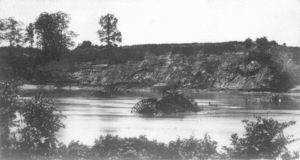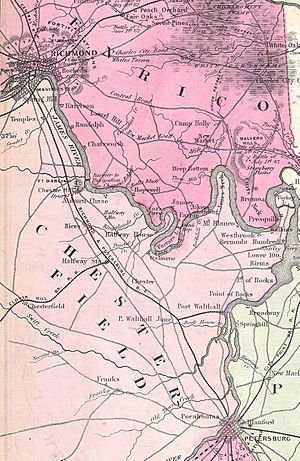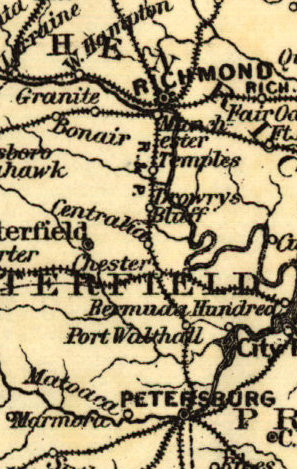Drewry's Bluff facts for kids
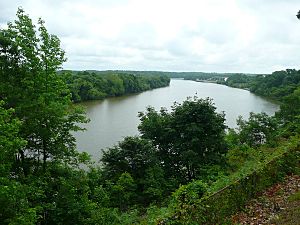
Drewry's Bluff is a high cliff located in Chesterfield County, Virginia. It was a very important place during the American Civil War. The Confederates built a strong fort there called Fort Darling. The bluff was named after Captain Augustus H. Drewry, who owned the land.
The James River flows past Richmond, Virginia. At this point, the river makes a sharp turn. Drewry's Bluff rises about 90 feet (27 meters) above the water. This high spot gave a clear view for miles downriver. Because of this, it was a perfect place to build defenses.
Contents
Drewry's Bluff During the Civil War
In March 1862, Captain Drewry's soldiers started building defenses at the bluff. They built earthworks, which are walls made of dirt. They also set up barracks for soldiers and placed large cannons. These cannons included huge 10-inch and 8-inch Columbiad guns.
In May, the crew from the Confederate ironclad ship CSS Virginia joined them. Their ship had been sunk to prevent it from being captured. Commander Ebeneezer Farrand was in charge of the fort's defenses. He ordered ships to be sunk in the river below the bluff. This created a barrier to stop enemy ships.
The First Battle of Drewry's Bluff (1862)
The first big fight at Drewry's Bluff happened on May 15, 1862. Union Navy ships tried to attack Richmond by sailing up the James River. The fort's cannons fired at them. The Union ships, including the famous USS Monitor, couldn't aim their guns high enough to hit the fort well. After a long fight, the Union ships had to turn back. This victory kept Richmond safe from a water attack.
Fort Expansion and Training
For the next two years, Drewry's Bluff saw no more battles. Captain Sydney Smith Lee, who was General Robert E. Lee's brother, took command. He made the fort even stronger. Workers built more trenches to protect the land around Richmond. They also added a chapel, barracks, and officer quarters inside the fort.
Drewry's Bluff became an important training center. It was home to the Confederate States Naval Academy. It also had a training camp for the Confederate Marine Corps.
The Second Battle of Drewry's Bluff (1864)
On May 5, 1864, Union Major General Benjamin F. Butler landed his army nearby. They were only about 15 miles (24 km) south of Richmond. His troops advanced close to Drewry's Bluff. Some Union soldiers even captured the fort's outer defenses.
However, delays by Union generals gave the Confederates time to react. Confederate General P. G. T. Beauregard led a strong counterattack on May 16. Once again, the Union attempt to capture Richmond was stopped at Drewry's Bluff.
The Fall of Richmond
Drewry's Bluff remained a key part of Richmond's defense. But in April 1865, the nearby city of Petersburg fell. This meant Richmond could no longer be held. The soldiers at Drewry's Bluff had to leave the fort. They joined General Lee's army as it retreated west.
After the Confederates left, Union forces quickly cleared the river. On April 4, 1865, President Abraham Lincoln and his son Tad sailed past the fort. They were on their way to visit Richmond. The soldiers from Fort Darling eventually surrendered with Lee's army at Appomattox Court House.
Drewry's Bluff Today
Today, Drewry's Bluff is part of the National Park Service's Richmond National Battlefield Park. Visitors can explore 42 acres (17 hectares) of this historic land. You can stand in the old defense works and see the amazing view of the James River.
Two historical markers are located nearby. They tell more about the battles at Drewry's Bluff. They explain how the fort stopped Union naval attacks in 1862. They also describe the land battles in 1864 that protected Richmond.
Train Stop
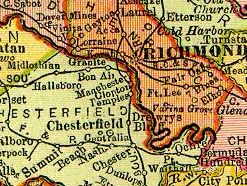

After the Civil War, Drewry's Bluff became a stop on the Richmond and Petersburg Railroad. This railroad ran between Falling Creek and Kingsland Creek. Today, the Defense Supply Center, Richmond is located in this area.


